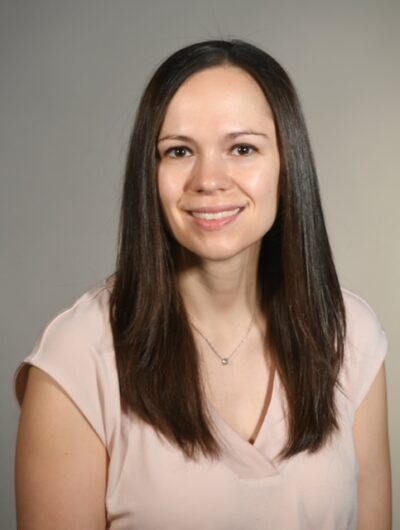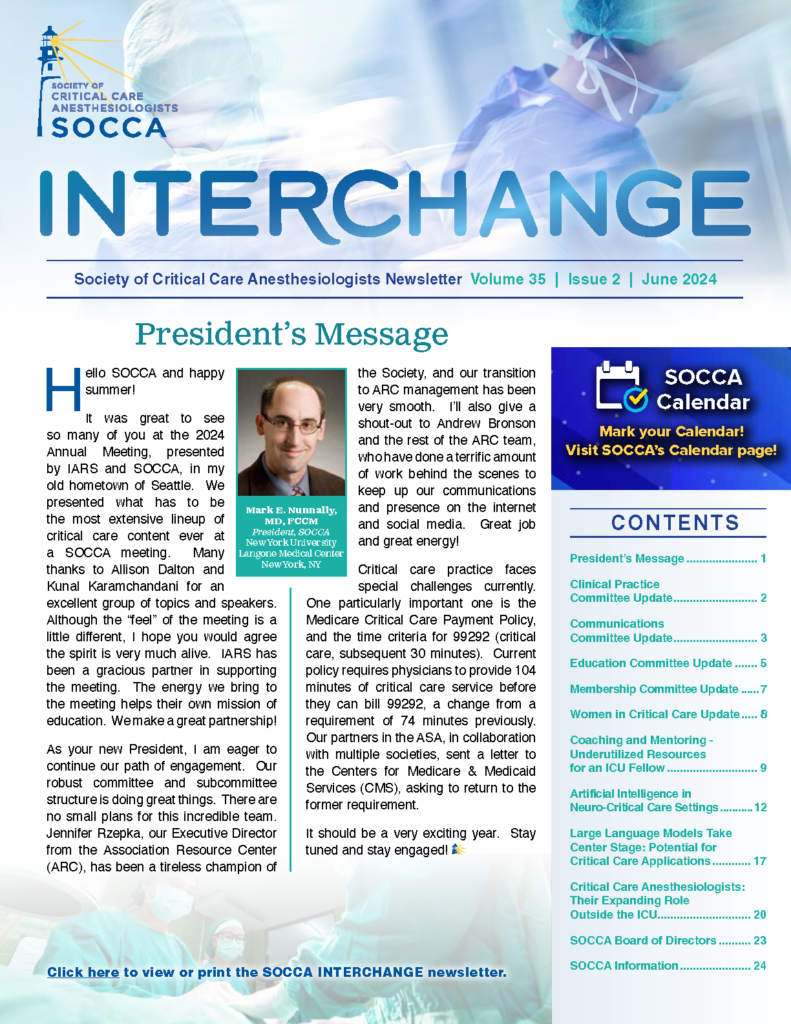Maintaining Work-Life Balance as an Early-Career Intensivist
How do you balance starting a career with having enough time for family or obligations outside work? Does having young children make it difficult to launch your career, or can you really do it all?
Dr. Schilling:
I started my Anesthesia-career with a family of two—my husband and me. Within 3-6 months of starting my specialty, we were blessed with a puppy and our miracle baby girl. I will say “balance” is far from something that can be sustainable with just one recipe. Many of the things that worked for me a few years ago definitely do not work today. I think that making a 5-10 year “career goal” and a similar 5-10 year “life goal” is imperative. Then seeing how the two goals interact and what changes need to be made so that you can make both those goals attainable. For example, my 10-year “career goal” is to become a Critical Care Medicine Director. How would that work with my daughter or if we wanted to further expand our family? What leadership positions would I have time to do now to set myself up for that career move?
Another aspect of balance is establishing priorities; big and small. In going through a divorce, constantly working on my marriage has become a huge priority. In battling infertility, soaking in all the moments with my daughter has taken precedence over joining another committee or picking up per diem Anesthesia shifts. If you choose to focus the next 10 years on finding your spouse and traveling the world, then make peace with your choice and have grace and patience with yourself regarding the things that have moved lower on your priority list. It is okay to have seasons in your life; you dictate what those seasons will focus on.
Children are hard but it is not a “difficulty”. I always knew I wanted to have a child more than I wanted to pursue Medicine. I strongly believe that if you have a flexible and strong support system, you can do many things and do them well. If I go back to my prior example, I do not think I can jump into a Medical Director position at this moment, but there are other roles I feel comfortable taking on while still making it home for bath time and story time. A great mentor once told me to divide my life into buckets and decide which bucket I want to give to on a daily, weekly, or yearly basis. For me, that means I am wholly engrossed in work while I am at work and when I am at home, I am completely focused on being present for my husband, daughter, and dog. After my daughter’s bedtime, I can sit and do some learning modules, catch up on my emails, and plan my sister’s bridal shower.
Dr. Sutherland:
It’s hard! I had my first child 6 weeks after becoming a new attending, so taking maternity leave was stressful. I was sure I would forget all my training while I was gone. Fortunately, that was not the case, and I felt very ready to come back to work. But having a family affects everyone differently. For me, I love my job, and this makes coming to work every day easier even though I miss my kids. But there are moments I miss at home because I’m at work, and there are events at work that I just can’t attend because of family obligations. I try to prioritize the important events, request time off early, and acknowledge that I just won’t be able to get as much done at home as I used to. There are many compromises while trying to “do it all”.
Do you ever feel like people treat you differently at work because you have a family or other non-work obligations?
Dr. Schilling:
My first job was at a private practice anesthesia group where many of my colleagues did not understand my requests for time off for IVF ultrasounds, etc. In trying to keep aspects of our fertility journey private, I was labeled as someone who never wanted to work. That label was a huge blow to my ego and was far from the physician I wanted to be perceived as. This was in part due to my naiveté in finding a flashy job and not taking the time to learn the demographics of my future partners. Currently, I am a part of a team of Intensivists who are all in similar stages of life. For a few months, two of us were nursing mothers, we would just alternate covering each other’s unit while the other one went to pump. Finding a supportive work environment was never something we are taught to seek. Do not let anyone tell you that you need to settle for a pay cut to find a job that supports you as an ambitious career woman, a new doctor-mom, or whatever you may define yourself as. You can have a job that values you financially, has a schedule that fits your family, and cultivates a supportive working environment. Spend the time and search for your perfect position. Do not settle.
Dr. Sutherland:
I purposely chose a workplace with a very supportive environment and many faculty members with families and young children. It's the norm here to have life events that you need to get to outside of work. People are very understanding and flexible, and it makes the time I spend away from my family easier and more fulfilling.
How do you choose which assignments or position postings to take on to maintain a work-life balance?
Dr. Schilling:
As far as daily assignments, being an anesthesiologist was hard. If you are in a position that allows you to pick your assignment for the day as a production-based anesthesiologist, then that could mean choosing between a good paycheck or making it for school pick-up. The nature of practicing in a hospital-based setting is comprised of add-on OR cases, emergencies or traumas, STAT C-sections, and the untimely call from labor and delivery for an epidural. Compared to that, transitioning into a full-time ICU role has given me a far more predictable schedule. I do not get to pick how many admits or consults I do in a day, and I work non-stop during my 7-day stretches in the unit, but when I am off, I am completely off. Granted, as you move up in your career, those 7-days of unplugged bliss start filling up with Zoom obligations, email responses, and random paperwork. However, if you understand those expectations, then you can work around them. YOU define your work-life balance. Now that I have created my 10-year “career goal,” I can triage what extracurricular assignments and tasks are manageable and work towards my goal. However, despite carefully choosing those extra projects, there are some weeks when I feel off balance. I consciously try to reset and implement subtle changes to improve my flow for the next week.
Dr. Sutherland:
I’m a big planner, and I think this has been helpful in managing my work and home life. I purposely choose call weekends when we don’t have anything planned, and I put in early requests to be post-call or vacation days when I need to be at home. My husband and I share a Google calendar with our work and non-work schedules to make sure we have the necessary childcare. In terms of academic projects, I’m working to get better at saying no and only taking on projects that interest me and will help advance my career. But this is obviously easier said than done! I also have a strict rule that I don’t do work in the evenings or on weekends so I can spend time with my family. I try to use my time at work or on post-call and nonclinical days to be productive with academic projects.
Do you think women are unequally affected by the issue of work-life balance?
Dr. Schilling:
I think physiologically women have more to juggle with and I believe we were created with the capacity to handle it. I have a rockstar female co-intensivist, her background is Emergency Medicine. We laugh about how we can start dinner, put a load of laundry in, give the baby a snack, check back on dinner, finish feeding the baby, then move the clothes to the dryer, all within a few hours’ time. We mimic our ICU workflow at home, and it works wonders. Meanwhile, if it were just left to our husbands, the house would fall apart on laundry day. The men-women, mommy-daddy dynamics will never change. It has been a constant learning process as I grow in my marriage and as our daughter’s needs change so much on a week-by-week basis. However, as a female physician, I struggle with all the extra effort I need to put into just being a doctor. I was just asking one of my female colleagues if she feels just as exhausted in just showing up to play the same game that may have been built for our male colleagues. My male colleagues can run around the whole hospital and never have to stop and explain who they are, justify their credentials, or demand personal or professional respect. Meanwhile, if I am not completely ignored, I am either the janitor, transporter, or nurse’s aide. I am never assumed to be the physician, whereas my male medical student or intern is always presumed to be my “senior.” This is the aspect of our profession that has the potential to break me down, especially in an ICU where there are so many social interactions with staff, families, and patients. I come home exhausted just from trying to prove why I should have a seat at the table of a treatment team where I am the Attending Physician. This subliminal struggle is what throws off my work-balance and is a common plight of many of my female colleagues.
Dr. Sutherland:
I do think there are a lot of physical hardships that women face with pregnancy, delivery, and breastfeeding that are unique and can be very physically and emotionally taxing. But every family has its own dynamic where home and work life are shared differently. I feel very fortunate to have a husband who shares equally in childcare responsibilities, so this puts less of a burden on me to manage our home life. I also work longer hours which naturally shifts some responsibilities away from me and onto my husband, and this helps make our marriage and partnership feel more balanced.
If you take on a project that becomes more work than you can handle with your outside-of-work life, what can you do without burning any bridges?
Dr. Schilling:
I recently was on the receiving end of this exact situation. A project partner did the right thing for themselves in triaging their obligations and dropping the one project that was too much work for little yield—which happened to be my project. For that young woman, I wholeheartedly applaud her. However, I was not prepared to carry out the bulk of the project. If you are feeling overextended, I would advise you to be honest with the commitment and those involved, examine why it has now exceeded your expectations, ask for help, and attempt to delegate. If you have exhausted all options to cope, then ask someone else to take the lead and help ease your burden. When you bring up these difficult conversations, always end the communication in a positive and reassuring way that reinforces your gratitude for the opportunity and that through this experience you will better be able to assess future projects.
Dr. Sutherland:
I think communication is incredibly important, both with your workplace and with your family and support system. It's essential to have support at home, whether that's from a partner, family, friends, or childcare providers, and I personally ask for help with childcare whenever I can. At work, if I'm feeling overwhelmed, I feel very comfortable talking to my bosses and colleagues to figure out the best way to manage work responsibilities. But that's not to say it's always easy! I've had to admit failure on projects in the past when I simply didn't have the time. This obviously can stir up a lot of difficult feelings, but in the end, one person can only do so much!
Do you have recommendations on what to do if you start to have trouble with work-life balance? What are some resources you can utilize?
Dr. Schilling:
I don’t have a cookie-cutter recommendation, as I am far from a guru in this area.
But I will happily tell you what I have learned in my short time juggling multiple commitments. There is NOT one answer, and my answer may not fit your problem. I believe that one should have a system in place to outsource your frustrations and in turn, feel validated and supported. I recorded a podcast mini-series with Stanford Medcast for “Women in Critical Care” and in doing that, I learned that ALL female physicians struggle with balance. I felt validated in my journey when I heard one of my mentors describe how she had to learn to place boundaries to protect her home life. In another episode, I interviewed a Marriage and Family Therapist, Alaina Henry, MA, LCPC, NCC who also talked about the importance of boundaries but also gave great advice regarding how to cope with trauma and stress via Eye Movement Desensitization and Reprocessing (EMDR). Putting effort into building that support system, utilizing your faith or beliefs, and taking time to rekindle your passions, are doable steps in your journey towards finding sustainable peace in your work and home life. Everyone struggles at some point or another, so be honest with yourself, give yourself grace, and don’t give up on finding peace and happiness because it is obtainable. I think work-life balance may be a myth and maybe the entire concept should be redefined as peace in your work-life world.
Dr. Sutherland:
I can't emphasize enough how important it is to have a reliable support system. I have a very supportive husband whose work hours are more flexible than mine, so he gets the kids to school in the morning and often picks them up when I'm on call. I also have extended family nearby that can help out in a pinch, and they love to come to spend time with us on weekends. As much as I personally hate asking for help, when I’m feeling overwhelmed, I know it’s important for my mental health. The place where I work also has an office of work-life which offers some helpful resources.
Stream the Stanford Medcast Women in Critical Care Mini-Series Podcasts






































